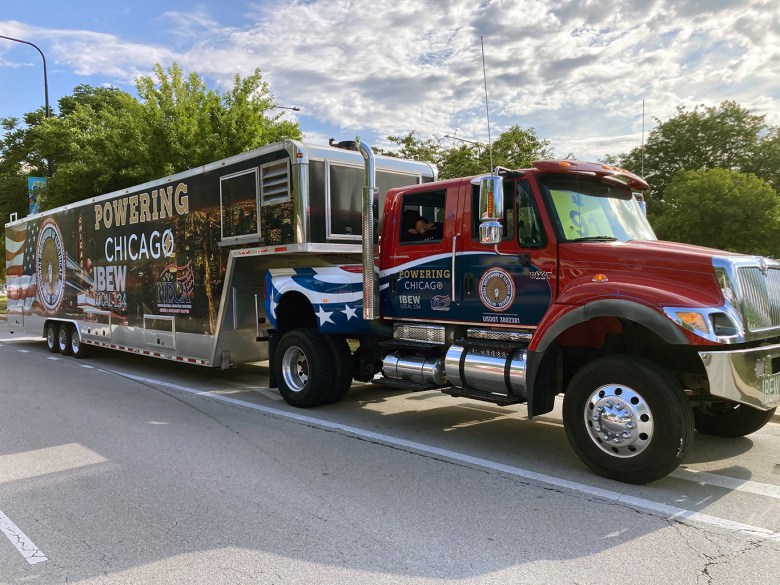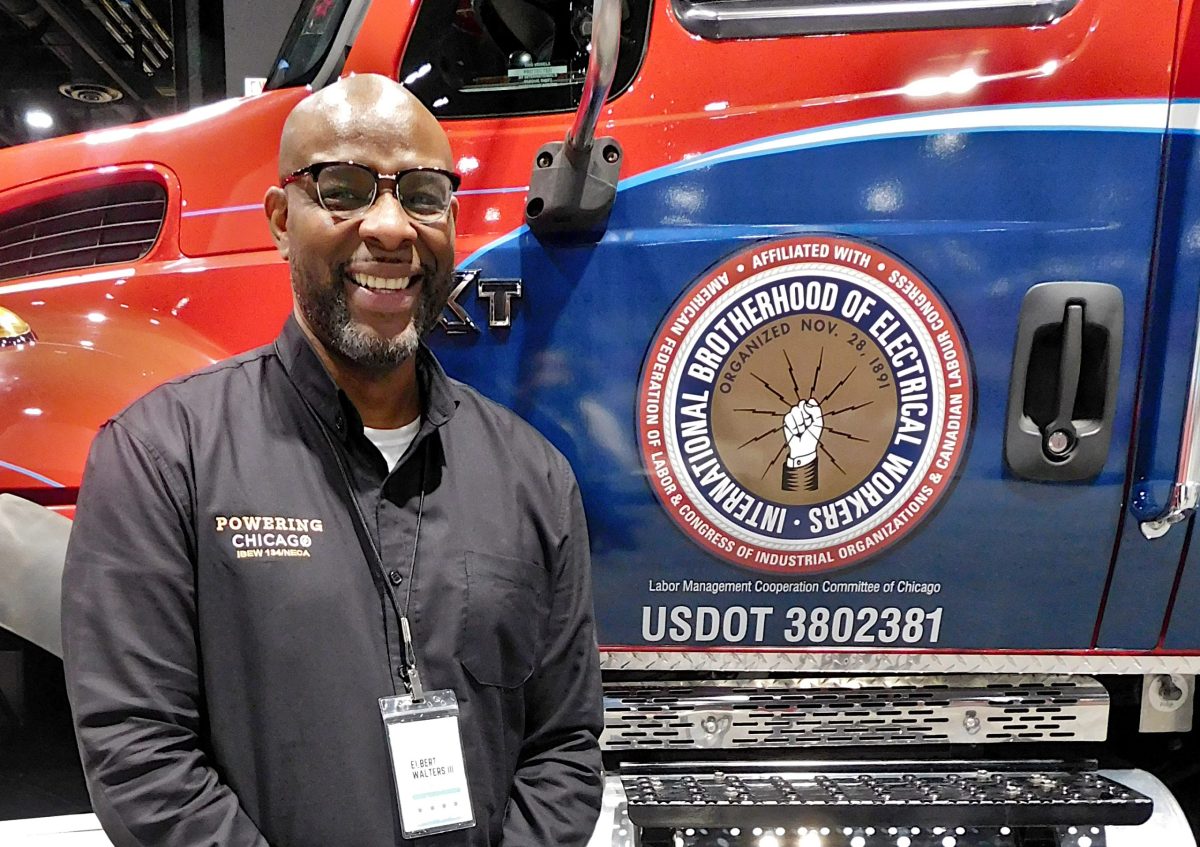In the future, electricians may be just as likely to be tasked with connecting a solar array or an electric vehicle charging station as they are called upon to wire a house or install new outlets.
A Chicago-area partnership is helping the profession fill this need, while also committing to expand its training and opportunities for union membership to women and members of environmental justice communities.
Elbert Walters III, the executive director of Powering Chicago, is an African American who rose through the ranks as a member of the International Brotherhood of Electrical Workers (IBEW) Local 134. He was introduced to the career opportunities of the skilled trades during his youth.
“I had a family member. He and I were really, really close, Walters said. “I had two jobs taking care of a family. He was driving a very expensive car at that time, and I knew that he only had one job. He told me that he was an apprentice for IBEW, and I immediately said, ‘Where do I sign up?’”
Powering Chicago is a collaboration between Local 134 electricians and the Electrical Contractors’ Association of Chicago and Cook County. The two entities share a 120,000-square-foot training center that includes full-size residential and commercial mock-ups, along with the first solar electric training facility in the state — providing training for apprentices in the clean energy space.
Powering Chicago and IBEW handle installations and equipment updates for ComEd. They also provide licensed contractors with specialized training to install electrical equipment — including electric vehicle charging stations — to community organizations and other entities.
Walters is passionate about expanding union membership to other members of BIPOC and disinvested communities, and to women.
“We have a broad demographic of electricians that make up our industry,” Walters said. “And that’s what makes us so appealing, I think, not just to some of the mandates that are coming down through legislation, but also because our demographic represents the neighborhoods in which we work and live.”
‘We want to take part’
Powering Chicago also administers a training program in the installation of EV chargers and related components, an area where the organization has been active since 2008. Apprentices must complete a rigorous five-year program that includes more than 8,000 hours of classroom, hands-on and on-site job training, Walters said.
“We saw where the trend was going; we invested in building a solar and renewable energy field in our campus to train our up-and-coming apprentices on this technology [that incorporates] solar, wind, battery storage, and of course EV technology,” Walters said.
“All these things are added onto our foundational knowledge, so that when we go out and install this equipment, it’s built the same way that we’ve built this city since we’ve been around. And that’s safe, reliable electrical infrastructure.”
Training opportunities also exist for individuals outside the formal union apprenticeship structure. In 2021, ComEd collaborated with Powering Chicago and the IBEW Renewable Energy Fund to provide a summer training program to a cohort of local high school students. After five days of training at IBEW-NECA Technical Institute, cohort members worked on a job with a local electrical contractor where they participated in an installation exercise to construct and test a solar energy system.
Powering Chicago also maintains partnerships with area community colleges and four-year institutions like the Illinois Institute of Technology on Chicago’s Near South Side. Many IBEW apprentices complete coursework to earn associates and other degrees that enhance their career prospects.
Powering Chicago also extends its outreach beyond traditional training avenues for the skilled trades, Walters said.
“We’ve been adamant about participating in job fairs. We connect with different high schools. And we are seeing high schools more than ever now reaching out to us and saying, ‘We want to take part’,” Walters said.
Through the Illinois IBEW Renewable Energy Fund program, Powering Chicago also operates the Craft Apprenticeship program, designed to provide training for people exiting the correctional system.
This type of opportunity resonates with Walters, who admits to his own rough spots — and to having no previous experience when he began his apprenticeship training.
“I was a very smart student. My plan was to go to college and I had got accepted to a few colleges. But my lifestyle wasn’t the best. I made some bad choices. And so there were only a few opportunities that were afforded to me,” Walters said. “The beautiful thing about this industry is that through our apprenticeship program, we teach you everything you need to know. You don’t need to know what a hammer is. You don’t need to know what a screwdriver is. They will teach you all those components.”

Recruiting on wheels
Along with its main training facility, Powering Chicago also operates a mobile training lab with hands-on components. The facility was recently displayed at the 2023 Chicago Auto Show as part of its larger EV Learning Center.
The mobile training lab allows Powering Chicago to reach audiences who would otherwise be unable to obtain its training, Walters said.
“The reason why we have this beautiful semi behind us as a backdrop is because this is another recruiting tool that we use. So, for instance, individuals in the city, from communities that can’t afford to get out to our training [facility] — we’re able to bring that training to them, and there we showcase to them what it is to have a day in the life of an apprentice,” Walters said.
The mobile unit includes several stations that illustrate what goes on behind the walls when consumers or commercial customers flip a switch. The complexity of several of the models affirms the importance of working with trained professionals.
“This is why it is not a do-it-yourself type of situation. The last thing you want to do, if you invest in an electric vehicle — it’s plugged up in your garage and then it doesn’t work,” Walters said. “And so, this is where understanding where the electrical code comes in, and that’s where our contractors are highly skilled and highly qualified for their work.”
In its activities in various communities, participating in events like the Auto Show, and especially its training program, Powering Chicago is positioning itself as a point of reference for both consumers and the overall electrical industry.
“Our purpose is to be a resource. Whether you want to purchase an EV vehicle now, or you want to purchase an EV vehicle later, understand that the infrastructure needs to be built, and we are that resource. We are that party that you need to contact to make sure that it’s the best investment that you’ve ever taken part in,” Walters said.
Correction: This article was updated to correct a misspelling of Elbert Walters III.

